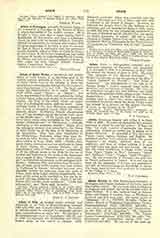

Adam of Saint Victor, a prominent and prolific writer of Latin hymns, b. in the latter part of the twelfth century, probably at Paris; d. in the Abbey of Saint Victor then in the suburbs of Paris but included in it subsequently through the city’s growth, some time between 1172 and 1192. By those more nearly his contemporaries he is styled “Brito”, a word which means “Briton”, or “Breton”. But as he was educated in Paris, and entered the Abbey of Saint Victor when quite young, he was presumably French. He lived in the abbey, which was somewhat of a theological center, until his death. Adam of Saint Victor is the most illustrious exponent of the revival of liturgical poetry which the twelfth century affords. Archbishop Trench characterizes him as “the foremost among the sacred Latin poets of the Middle Ages“. Of his hymns and sequences some thirty-seven were published in the “Elucidatorium Ecclesiasticum” of Clichtoveus, a Catholic theologian of the sixteenth century. Nearly all of the remaining seventy were preserved in the Abbey of Saint Victor up to the time of its dissolution in the Revolution. They were then transferred to the Bibliotheque Nationale, where they were discovered by Leon Gautier, who edited the first complete edition of them (Paris, 1858). Besides these poetic works, some prose ones are attributed to Adam of Saint Victor, viz., “Summa Britonis, seu de difficilioribus verbis in Biblia contentis”, a dictionary of all the difficult words in the Bible for the use of novices and beginners in the study of the Scriptures; and a sequel to this, “Expositio super omnes prologos”, an historical commentary on the prologues of St. Jerome. Fabricius, Pits, and others deny his authorship of these prose works, saying they were written by Guillaume le Breton. Levesque advances some plausible reasons for believing them the work of Adam, while Abbe Lejay declares emphatically that none of the prose works ascribed to him can be regarded with any likelihood as his. Some of his best hymns are “Laudes crucis attolamus”, “Verbi vere substantivi”, and “Stola regni laureatus”.
JOHN J. A’ BECKETT.

